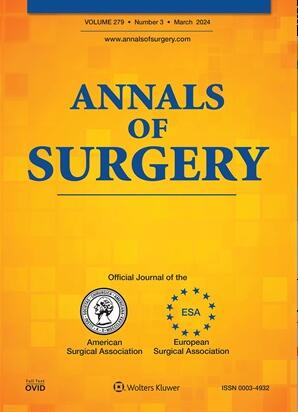Clinical Momentum: An Observational Study Identifying Latent Forces Driving Surgical Interventions for Older Adults Near the End of Life.
IF 6.4
1区 医学
Q1 SURGERY
引用次数: 0
Abstract
OBJECTIVE We evaluated the empirical fit of our model of clinical momentum for older adults with life-limiting illness undergoing unplanned surgery. BACKGROUND Older adults often undergo surgery near the end of life, in contrast to generally stated preferences. Systems forces promoting intervention may produce nonbeneficial treatment despite advances in communication. We conducted an observational study to understand how a conceptual model of clinical momentum might apply to patients with life-limiting illnesses having surgery. METHODS We interviewed 29 interdisciplinary clinicians caring for 8 patients age 65+ with life-limiting illness who underwent unplanned surgical intervention. We evaluated physical, cognitive, and social behavioral processes related to the course of care. We used content analysis to code interview transcripts and higher-level analysis to understand the empirical fit of the conceptual model. RESULTS We found evidence of model components, including "fix it" and "recognition-primed decision-making" that related to actual clinical events and processes that occurred for patients, promoting a default of surgical intervention followed by an accumulating "cascade" of interventions that generated a perception of "sunk costs." We identified novel momentum accelerators including binary options and care fragmentation. Clinicians expressed concerns that surgery was nonbeneficial but were unable to disrupt this momentum in the moment of decision-making around surgery. We identified momentum disruption when the patient's abnormality could not be fixed and additional surgery was not considered or offered. CONCLUSIONS Clinical momentum characterizes systems forces leading to acute surgical intervention for patients with life-limiting illnesses despite surgeon concerns that the treatment does more harm than good. These forces are difficult to disrupt and may require interventions beyond improved communication to reduce nonbeneficial therapy.临床动力:一项观察性研究确定了在接近生命末期的老年人中驱动手术干预的潜在力量。
目的:我们评估我们的临床动力模型对接受计划外手术的限制生命疾病的老年人的经验拟合性。年龄较大的成年人通常在生命接近尾声时接受手术,这与通常所说的偏好相反。尽管通信有所进步,但促进干预的系统力量可能产生无益的治疗。我们进行了一项观察性研究,以了解临床动力的概念模型如何适用于接受手术的限制性疾病患者。方法:我们对8例65岁以上的限制性疾病患者进行了计划外手术干预的29名跨学科临床医生进行了访谈。我们评估了与护理过程相关的身体、认知和社会行为过程。我们使用内容分析来编码访谈记录,并使用更高层次的分析来理解概念模型的经验拟合。结果我们发现了模型组件的证据,包括“修复它”和“识别启动决策”,这些组件与患者发生的实际临床事件和过程相关,促进了手术干预的默认值,随后是累积的“级联”干预,产生了“沉没成本”的感知。我们发现了新的动量加速器,包括二元期权和护理碎片化。临床医生表示担心手术是无益的,但无法在手术决策的时刻破坏这种势头。当患者的异常不能固定,并且没有考虑或提供额外的手术时,我们确定了动量中断。结论临床动力是导致对生命限制疾病患者进行急性手术干预的系统力量的特征,尽管外科医生担心这种治疗弊大于利。这些力量很难被破坏,可能需要除了改善沟通之外的干预措施来减少无益的治疗。
本文章由计算机程序翻译,如有差异,请以英文原文为准。
求助全文
约1分钟内获得全文
求助全文
来源期刊

Annals of surgery
医学-外科
CiteScore
14.40
自引率
4.40%
发文量
687
审稿时长
4 months
期刊介绍:
The Annals of Surgery is a renowned surgery journal, recognized globally for its extensive scholarly references. It serves as a valuable resource for the international medical community by disseminating knowledge regarding important developments in surgical science and practice. Surgeons regularly turn to the Annals of Surgery to stay updated on innovative practices and techniques. The journal also offers special editorial features such as "Advances in Surgical Technique," offering timely coverage of ongoing clinical issues. Additionally, the journal publishes monthly review articles that address the latest concerns in surgical practice.
 求助内容:
求助内容: 应助结果提醒方式:
应助结果提醒方式:


